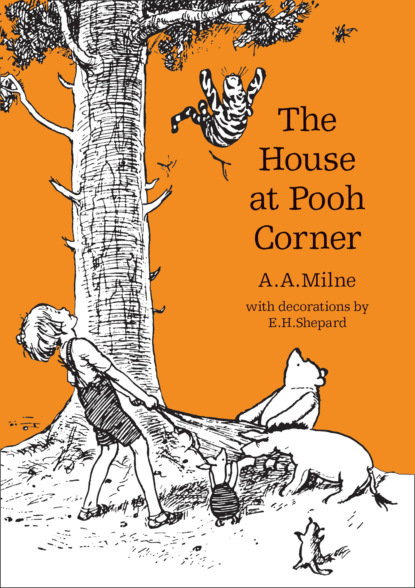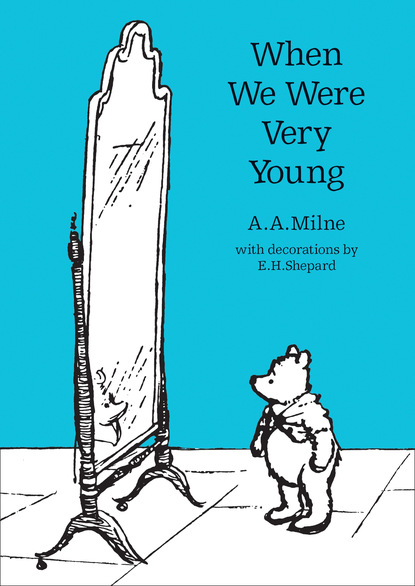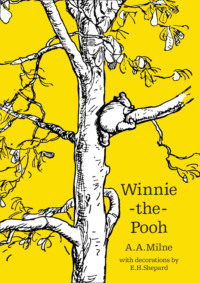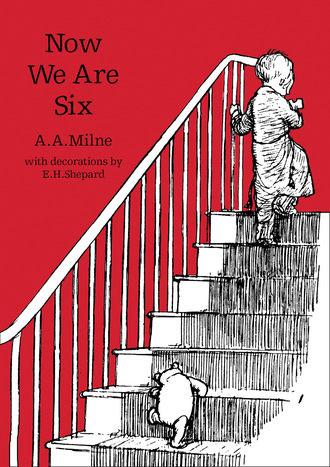
Полная версия
Now We Are Six

Now We Are Six
A. A. Milne
with the originalillustrations by E. H. Shepard, in colour

www.egmont.co.uk
Copyright
First published 13 October 1927 by Methuen & Co. Ltd
Published in this edition 2004 by Egmont Books Limited
239 Kensington High Street, London W8 6SA
Text by A. A. Milne copyright © Trustees of the Pooh Properties
Line illustrations copyright © E. H. Shepard
Colouring of the illustrations by Mark Burgess
copyright © 1989 Egmont UK Limited
All rights reserved. No part of this publication may be reproduced, distributed, or transmitted in any form or by any means, or stored in a database or retrieval system, without the prior written permission of the publisher.
First e-book edition April 2010
ISBN 978 1 4052 55844
1 3 5 7 9 10 8 6 4 2
A CIP catalogue record for this title is available
from the British Library
This paperback is sold subject to the condition that it shall not, by way of trade or otherwise, be lent, resold, hired out, or otherwise circulated without the publisher’s prior consent in any form of binding or cover other than that in which it is published and without a similar condition including this condition being imposed on the subsequent purchaser.
Dedication
TO
Anne Darlington NOW SHE IS SEVEN AND BECAUSE SHE IS SO SPESHAL
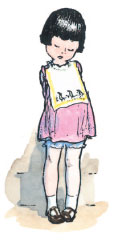
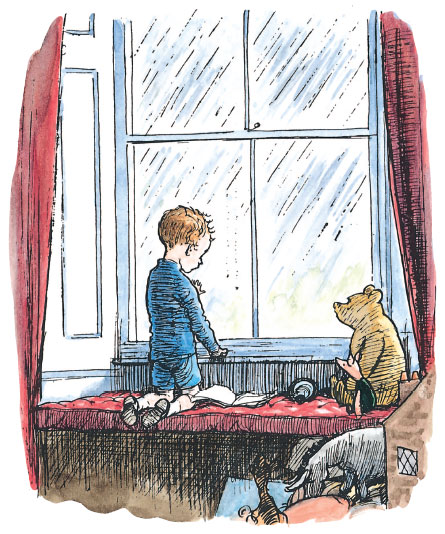
INTRODUCTION
When you are reciting poetry, which is a thing we never do, you find sometimes, just as you are beginning, that Uncle John is still telling Aunt Rose that if he can’t find his spectacles he won’t be able to hear properly, and does she know where they are; and by the time everybody has stopped looking for them, you are at the last verse, and in another minute they will be saying, ‘Thank-you, thank-you,’ without really knowing what it was all about. So, next time, you are more careful; and, just before you begin you say, ‘Er-h’r’m!’ very loudly, which means, ‘Now then, here we are’; and everybody stops talking and looks at you; which is what you want. So then you get in the way of saying it whenever you are asked to recite … and sometimes it is just as well, and sometimes it isn’t … and by and by you find yourself saying it without thinking. Well, this bit which I am writing, called Introduction, is really the er-h’r’m of the book, and I have put it in, partly so as not to take you by surprise, and partly because I can’t do without it now. There are some very clever writers who say that it is quite easy not to have an er-h’r’m, but I don’t agree with them. I think it is much easier not to have all the rest of the book.
What I want to explain in the Introduction is this. We have been nearly three years writing this book. We began it when we were very young … and now we are six. So, of course, bits of it seem rather babyish to us, almost as if they had slipped out of some other book by mistake. On page whatever-it-is there is a thing which is simply three-ish, and when we read it to ourselves just now we said, ‘Well, well, well,’ and turned over rather quickly. So we want you to know that the name of the book doesn’t mean that this is us being six all the time, but that it is about as far as we’ve got at present, and we half think of stopping there.
A. A. M.
P. S. – Pooh wants us to say that he thought it was a different book; and he hopes you won’t mind, but he walked through it one day, looking for his friend Piglet, and sat down on some of the pages by mistake.
Table of Contents
Cover Page
Title Page
Copyright
Dedication
INTRODUCTION
SOLITUDE
KING JOHN’S CHRISTMAS
BUSY
SNEEZLES
BINKER
CHERRY STONES
THE KNIGHT WHOSE ARMOUR DIDN’T SQUEAK
BUTTERCUP DAYS
THE CHARCOAL-BURNER
US TWO
THE OLD SAILOR
THE ENGINEER
JOURNEY’S END
FURRY BEAR
FORGIVEN
THE EMPEROR’S RHYME
KNIGHT-IN-ARMOUR
COME OUT WITH ME
DOWN BY THE POND
THE LITTLE BLACK HEN
THE FRIEND
THE GOOD LITTLE GIRL
A THOUGHT
KING HILARY AND THE BEGGARMAN
SWING SONG
EXPLAINED
TWICE TIMES
THE MORNING WALK
CRADLE SONG
WAITING AT THE WINDOW
PINKLE PURR
WIND ON THE HILL
FORGOTTEN
IN THE DARK
THE END
SOLITUDE
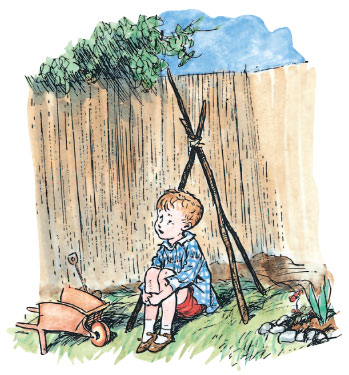
I have a house where I go
When there’s too many people,
I have a house where I go
Where no one can be;
I have a house where I go,
Where nobody ever says ‘No’;
Where no one says anything – so
There is no one but me.
KING JOHN’S CHRISTMAS
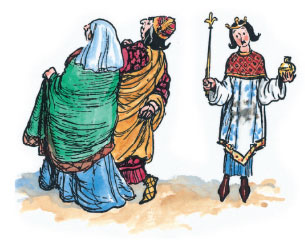
King John was not a good man –
He had his little ways.
And sometimes no one spoke to him
For days and days and days.
And men who came across him,
When walking in the town,
Gave him a supercilious stare,
Or passed with noses in the air –
And bad King John stood dumbly there,
Blushing beneath his crown.
King John was not a good man,
And no good friends had he.
He stayed in every afternoon …
But no one came to tea.
And, round about December,
The cards upon his shelf
Which wished him lots of Christmas cheer,
And fortune in the coming year,
Were never from his near and dear,
But only from himself.
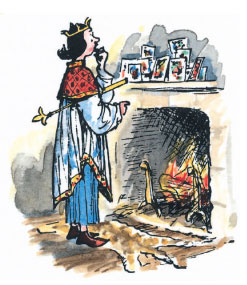
King John was not a good man,
Yet had his hopes and fears.
They’d given him no present now
For years and years and years.
But every year at Christmas,
While minstrels stood about,
Collecting tribute from the young
For all the songs they might have sung,
He stole away upstairs and hung
A hopeful stocking out.
King John was not a good man,
He lived his life aloof;
Alone he thought a message out
While climbing up the roof.
He wrote it down and propped it
Against the chimney stack:
‘TO ALL AND SUNDRY – NEAR AND FAR –
F. CHRISTMAS IN PARTICULAR.’
And signed it not ‘Johannes R.’
But very humbly, ‘JACK.’
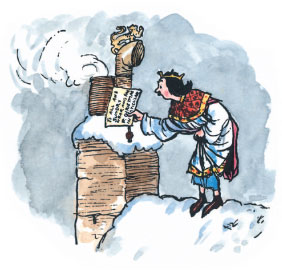
‘I want some crackers,
And I want some candy;
I think a box of chocolates
Would come in handy;
I don’t mind oranges,
I do like nuts!
And I SHOULD like a pocket-knife
That really cuts.
And, oh! Father Christmas, if you love me at all,
Bring me a big, red india-rubber ball!’
King John was not a good man –
He wrote this message out,
And gat him to his room again,
Descending by the spout.
And all that night he lay there,
A prey to hopes and fears.
‘I think that’s him a-coming now,’
(Anxiety bedewed his brow.)
‘He’ll bring one present, anyhow –
The first I’ve had for years.’
‘Forget about the crackers,
And forget about the candy;
I’m sure a box of chocolates
Would never come in handy;
I don’t like oranges,
I don’t want nuts,
And I HAVE got a pocket-knife
That almost cuts.
But, oh! Father Christmas, if you love me at all,
Bring me a big, red india-rubber ball!’
King John was not a good man –
Next morning when the sun
Rose up to tell a waiting world
That Christmas had begun,
And people seized their stockings,
And opened them with glee,
And crackers, toys and games appeared,
And lips with sticky sweets were smeared,
King John said grimly: ‘As I feared,
Nothing again for me!’
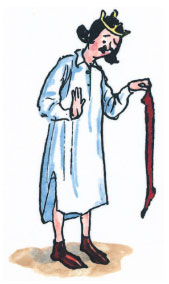
‘I did want crackers,
And I did want candy;
I know a box of chocolates
Would come in handy;
I do love oranges,
I did want nuts.
I haven’t got a pocket-knife –
Not one that cuts.
And, oh! if Father Christmas had loved me at all,
He would have brought a big, red india-rubber ball!’
King John stood by the window,
And frowned to see below
The happy bands of boys and girls
All playing in the snow.
A while he stood there watching,
And envying them all …
When through the window big and red
There hurtled by his royal head,
And bounced and fell upon the bed,
An india-rubber ball!
AND OH, FATHER CHRISTMAS
MY BLESSINGS ON YOU FALL
FOR BRINGING HIM
A BIG, RED
INDIA-RUBBER
BALL!
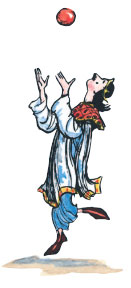
Конец ознакомительного фрагмента.
Текст предоставлен ООО «ЛитРес».
Прочитайте эту книгу целиком, купив полную легальную версию на ЛитРес.
Безопасно оплатить книгу можно банковской картой Visa, MasterCard, Maestro, со счета мобильного телефона, с платежного терминала, в салоне МТС или Связной, через PayPal, WebMoney, Яндекс.Деньги, QIWI Кошелек, бонусными картами или другим удобным Вам способом.




